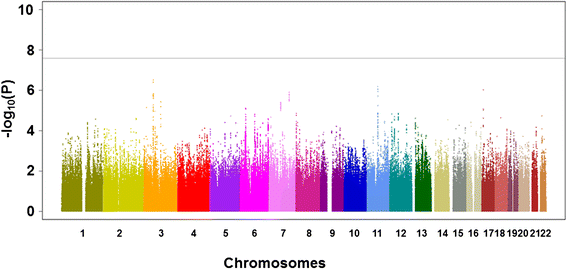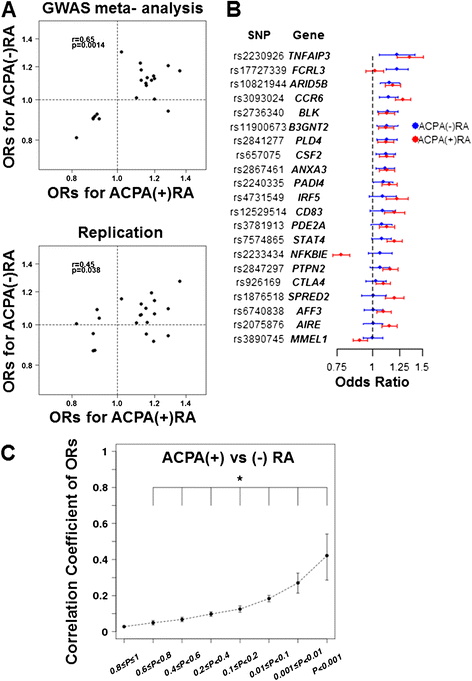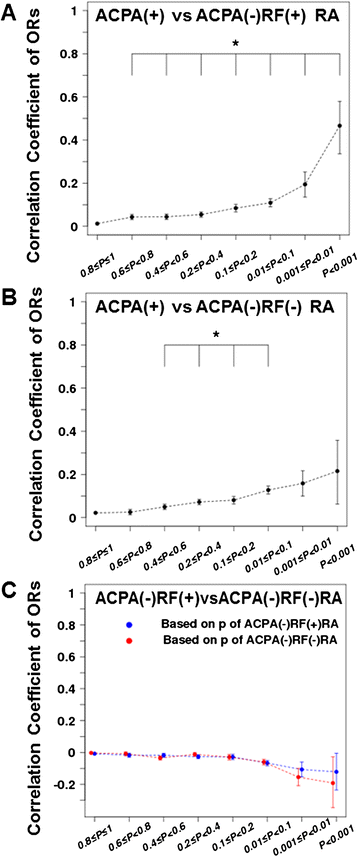Anti-citrullinated peptide/protein antibody (ACPA)-negative RA shares a large proportion of susceptibility loci with ACPA-positive RA: a meta-analysis of genome-wide association study in a Japanese population
- PMID: 25927497
- PMCID: PMC4431175
- DOI: 10.1186/s13075-015-0623-4
Anti-citrullinated peptide/protein antibody (ACPA)-negative RA shares a large proportion of susceptibility loci with ACPA-positive RA: a meta-analysis of genome-wide association study in a Japanese population
Abstract
Introduction: Although susceptibility genes for anti-citrullinated peptide/protein antibodies (ACPA)-positive rheumatoid arthritis (RA) have been successfully discovered by genome-wide association studies (GWAS), little is known about the genetic background of ACPA-negative RA. We intended to elucidate genetic background of ACPA-negative RA.
Method: We performed a meta-analysis of GWAS comprising 670 ACPA-negative RA and 16,891 controls for 1,948,138 markers, followed by a replication study of the top 35 single nucleotide polymorphisms (SNPs) using 916 cases and 3,764 controls. Inverse-variance method was applied to assess overall effects. To assess overlap of susceptibility loci between ACPA-positive and -negative RA, odds ratios (ORs) of the 21 susceptibility markers to RA in Japanese were compared between the two subsets. In addition, SNPs were stratified by the p-values in GWAS meta-analysis for either ACPA-positive RA or ACPA-negative RA to address the question whether weakly-associated genes were also shared. The correlations between ACPA-positive RA and the subpopulations of ACPA-negative RA (rheumatoid factor (RF)-positive and RF-negative subsets) were also addressed.
Results: Rs6904716 in LEMD2 of the human leukocyte antigen (HLA) locus showed a borderline association with ACPA-negative RA (overall p = 5.7 × 10(-8)), followed by rs6986423 in CSMD1 (p = 2.4 × 10(-6)) and rs17727339 in FCRL3 (p = 1.4 × 10(-5)). ACPA-negative RA showed significant correlations of ORs with ACPA-positive RA for the 21 susceptibility SNPs and non-HLA SNPs with p-values far from significance. These significant correlations with ACPA-positive RA were true for ACPA-negative RF-positive and ACPA-negative RF-negative RA. On the contrary, positive correlations were not observed between the ACPA-negative two subpopulations.
Conclusion: Many of the susceptibility loci were shared between ACPA-positive and -negative RA.
Figures



References
-
- Kroot EJ, de Jong BA, van Leeuwen MA, Swinkels H, van den Hoogen FH, van’t Hof M, et al. The prognostic value of anti-cyclic citrullinated peptide antibody in patients with recent-onset rheumatoid arthritis. Arthritis Rheum. 2000;43:1831–1835. doi: 10.1002/1529-0131(200008)43:8<1831::AID-ANR19>3.0.CO;2-6. - DOI - PubMed
-
- Schellekens GA, Visser H, de Jong BA, van den Hoogen FH, Hazes JM, Breedveld FC, et al. The diagnostic properties of rheumatoid arthritis antibodies recognizing a cyclic citrullinated peptide. Arthritis Rheum. 2000;43:155–163. doi: 10.1002/1529-0131(200001)43:1<155::AID-ANR20>3.0.CO;2-3. - DOI - PubMed
-
- Ohmura K, Terao C, Maruya E, Katayama M, Matoba K, Shimada K, et al. Anti-citrullinated peptide antibody-negative RA is a genetically distinct subset: a definitive study using only bone-erosive ACPA-negative rheumatoid arthritis. Rheumatology (Oxford). 2010;49:2298–2304. doi: 10.1093/rheumatology/keq273. - DOI - PMC - PubMed
Publication types
MeSH terms
Substances
LinkOut - more resources
Full Text Sources
Other Literature Sources
Medical
Research Materials

